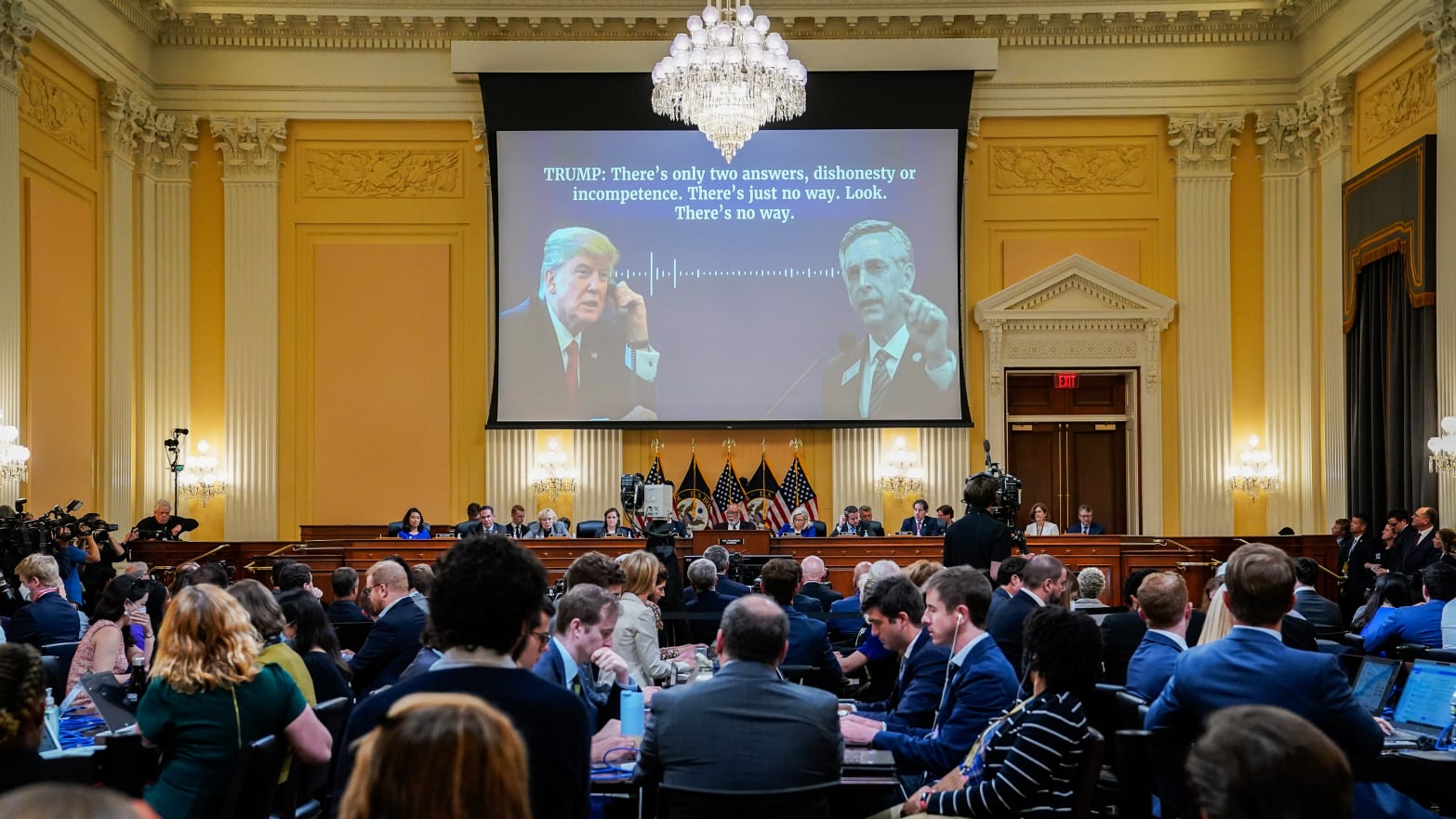Thanks to Georgia’s court system rules, the damning testimony of several former Trump administration officials—now being televised by the Jan. 6 Committee—could very well bolster the Fulton County District Attorney’s criminal investigation into former President Donald Trump’s menacing phone call to the state’s top elections official last year.
Georgia is a state where prosecutors seeking an indictment can present hearsay evidence to grand juries. That means the special grand jury currently underway in Atlanta can be shown how former Attorney General Bill Barr and others repeatedly told Trump that his election conspiracy theories were absolute nonsense—laying the groundwork to prove that he knowingly cited false accusations of election fraud when he intimidated Georgia’s secretary of state on Jan. 2, 2021.
According to a person familiar with the inner workings of the Fulton County District Attorney’s Office, prosecutors from the start have closely examined whether Trump and his lieutenants could be charged with breaking a Georgia state law against “criminal solicitation to commit election fraud.” Investigators could charge them if they find that any member of Trump’s team “solicits, requests, commands, importunes” or tries to get Georgia officials to “engage” in election fraud on the several recorded phone calls they made to Secretary of State Brad Raffensperger or his agency’s top investigator.
Prosecutors would have a hard time proving that Trump was engaging in a crime if he truly believed that there was actual fraud in Georgia, lawyers told The Daily Beast.
But in recent weeks, the Jan. 6 Committee’s half-dozen hearings have laid that to rest, playing video testimony from Trump advisers who recalled telling the commander-in-chief that the conspiracy theories were baseless.
“I told him that the stuff that his people were shoveling out to the public were—was—bullshit, that the claims of fraud were bullshit. And, you know, he was indignant about that,” Barr told congressional investigators in a videotaped deposition shared by the committee last month.
“I told him that it was crazy stuff, and they were wasting their time on that, and it was doing a grave disservice to the country,” Trump’s former AG added.
That testimony will be pivotal to the grand jury, said Adam S. Kaufmann, a white-collar defense lawyer who was previously a Manhattan prosecutor.
“Trump is going to cloak himself in that he believed he was right. What's going to be really important is what his advisers were saying to him at the time,” Kaufmann said. “The Fulton County D.A. is now able to put in front of that grand jury the Attorney General of the United States saying, ‘No, Mr. President, we investigated and there was no fraud.’”
“It makes it a lot easier,” he said.
The Peach State’s official “Grand Jury Handbook,” which is put together by the Prosecuting Attorneys’ Council of Georgia, makes clear that residents brought into court for those secret judicial proceedings can hear this kind of evidence.
“An unsworn, out-of-court statement… can be sufficient evidence on which the return of an indictment can be based,” it says.
Barr and other top Trump administration officials testified under penalty of perjury before the Jan. 6 Committee in recent months, which could lend additional weight to their assertions that Trump should have known better when he repeated baseless election fraud claims to Georgia officials.
For example, on his Saturday afternoon call with Georgia’s secretary of state on Jan. 2, 2021, Trump kept bringing up how a poll worker allegedly brought in “what looked to be suitcases or trunks” filled with “18,000 ballots, all for Biden.” It was a favorite conspiracy theory spread by former New York Mayor Rudy Giuliani, then acting as Trump’s lawyer, in a ploy to sow doubt among Georgia’s conservative state legislators.
However, in the month before Trump’s phone call, the top federal prosecutor in that district had already investigated that at the behest of Barr—and determined that no such thing occurred. Byung Jin "BJay" Pak, the U.S. Attorney for the Northern District of Georgia at the time, recalled the details of his conversation with Barr and the subsequent investigation when he testified before the committee on June 13.
“He asked me to find out what I could about it, because he had envisioned that in some days after our call that he was going to have to go to the White House for a meeting and that issue might come up. He asked me to make it a priority to get to the bottom of, to try to substantiate the allegation made by Mr. Giuliani,” Pak said.
“We found that the suitcase full of ballots—the alleged black suitcase that was being seen being pulled from under the table—was actually an official lockbox where ballots were kept safe,” he told Congresswoman Rep. Zoe Lofgren (D-CA).
Subpoenas issued to members of Trump’s team earlier this week in Georgia hint at how prosecutors are building a case that the former president and his lieutenants were engaged in a criminal conspiracy.
Subpoenas say that several of the witnesses were “involved in the multi-state, coordinated efforts to influence the results of the November 2020 election.”
That particular language raises red flags for Peter Odom, a former assistant district attorney in that office who prosecuted election criminal cases.
“Conspiracy is an agreement by two or more persons to commit a crime. It’s very clear they're having the grand jury looking at conspiracy by Donald Trump and his close associates to illegally influence the election,” Odom told The Daily Beast.
Neither the Fulton County DA’s Office nor the Jan. 6 Committee responded to questions on Thursday concerning the nature of their communications or the sharing of evidence.
The eight subpoenas issued on Tuesday demand testimony from several key players in Trump’s orbit. And while Trump himself didn’t receive a subpoena, the fact that he was missing may actually be proof that the Fulton County DA is proceeding with an investigation that primarily targets the former president, three attorneys told The Daily Beast.
“Trump is clearly the target of the investigation. And it's usual that either the target doesn't get a subpoena at all—or it comes at the very end of the process,” said Norman Eisen, an attorney who previously advised the House Judiciary Committee and helped build the case for Trump’s first impeachment.
One of those who got a subpoena this week is Sen. Lindsey Graham. A statement put out by his defense lawyers on Wednesday provided further indication of just how damning the Jan. 6 Committee’s support in the Georgia investigation could be. The senator’s two-person legal team, which announced it would try to fight the subpoena, criticized the investigation for being a “fishing expedition and working in concert with the January 6 Committee in Washington.”
“Senator Graham was well within his rights to discuss with state officials the processes and procedures around administering elections,” read the statement, which lambasts the DA’s investigation as merely “politics.”

